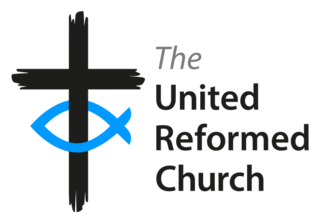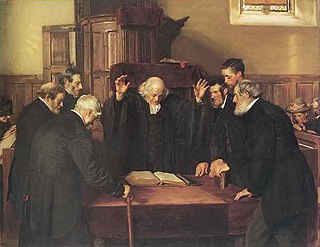
A parish is a territorial entity in many Christian denominations, constituting a division within a diocese. A parish is under the pastoral care and clerical jurisdiction of a priest, often termed a parish priest, who might be assisted by one or more curates, and who operates from a parish church. Historically, a parish often covered the same geographical area as a manor. Its association with the parish church remains paramount.

The Presbyterian Church (USA), abbreviated PCUSA, is a mainline Protestant denomination in the United States. It is the largest Presbyterian denomination in the country, known for its progressive stance on doctrine and its ordaining of women and members of the LGBT community as elders and ministers. The Presbyterian Church (USA) was established with the 1983 merger of the Presbyterian Church in the United States, whose churches were located in the Southern and border states, with the United Presbyterian Church in the United States of America, whose congregations could be found in every state.
Presbyterianpolity is a method of church governance typified by the rule of assemblies of presbyters, or elders. Each local church is governed by a body of elected elders usually called the session or consistory, though other terms, such as church board, may apply. Groups of local churches are governed by a higher assembly of elders known as the presbytery or classis; presbyteries can be grouped into a synod, and presbyteries and synods nationwide often join together in a general assembly. Responsibility for conduct of church services is reserved to an ordained minister or pastor known as a teaching elder, or a minister of the word and sacrament.

The Church of Scotland is a Presbyterian denomination of Christianity that holds the status of the national church in Scotland. It is one of the country's largest, having 259,200 members in 2023. While active membership in the church has declined significantly in recent decades, the government Scottish Household Survey found that 20% of the Scottish population, or over one million people, identified the Church of Scotland as their religious identity in 2019. The Church of Scotland's governing system is presbyterian in its approach, therefore, no one individual or group within the church has more or less influence over church matters. There is no one person who acts as the head of faith, as the church believes that role is the "Lord God's". As a proper noun, the Kirk is an informal name for the Church of Scotland used in the media and by the church itself.

The United Reformed Church (URC) is a Protestant Christian church in the United Kingdom. As of 2022 it had approximately 37,000 members in 1,284 congregations with 334 stipendiary ministers.

The Presbyterian Church in Canada is a Presbyterian denomination, serving in Canada under this name since 1875. The United Church of Canada claimed the right to the name from 1925 to 1939. According to the Canada 2021 Census 301,400 Canadians identify themselves as Presbyterian, that is, 0.8 percent of the population.

Wellington Church is a congregation and parish church of the Church of Scotland, serving part of the Hillhead area of Glasgow, Scotland. The building is located on University Avenue, Glasgow, opposite the University of Glasgow.
First published as the Federal Council Year Book in 1916, The Yearbook of American & Canadian Churches is a comprehensive descriptive and statistical listing of major religious bodies and other important religion-related organizations in the U.S. and Canada. The Yearbook contains descriptive information about the major religious bodies in the US and Canada, including features of their ecclesiology, history and theological principles, membership and financial statistics, official periodicals published by each religious group, as well as listings of each group's current officers.

The General Assembly of the Church of Scotland is the sovereign and highest court of the Church of Scotland, and is thus the Church's governing body. It generally meets each year and is chaired by a Moderator elected at the start of the Assembly.

A Church of Scotland congregation is led by its minister and elders. Both of these terms are also used in other Christian denominations: see Minister (Christianity) and Elder (Christianity). This article discusses the specific understanding of their roles and functions in the Scottish Church.

The Church Patronage (Scotland) Act 1711 or Patronage Act is an Act of the Parliament of Great Britain. The long title of the act is An Act to restore the Patrons to their ancient Rights of presenting Ministers to the Churches vacant in that Part of Great Britain called Scotland. Its purpose was to allow the noble and other Patrons in Scotland to gain control over the Church of Scotland parish churches again, having lost that custom in the Glorious Revolution.

James Meek FRSE (1742–1810) was Minister of Cambuslang from 1774 until his death. He was Moderator of the General Assembly of the Church of Scotland in 1795, but is most remembered as the model Enlightenment cleric who wrote the entry for Cambuslang in the First Statistical Account of Scotland.
Finlay A. J. Macdonald is a retired minister of the Church of Scotland. He was Principal Clerk to the General Assembly of the Church of Scotland from 1996 until 2010. In addition to his rapid rise up the ranks of the Church of Scotland, Macdonald is known for fostering co-operation between the various boards and committees which administer the Church and for steering the Church smoothly through its annual business meetings.

The Presbytery of the North East and Northern Isles is one of the fourteen presbyteries of the Church of Scotland, being the local presbytery for the city of Aberdeen. The current moderator is the Rev Hutton Steel who is minister of High Hilton Parish Church. The presbytery represents and supervises thirty six Church of Scotland congregations within the city. The office is at Mastrick Parish Church.

St. John's Renfield Church is a parish church of the Church of Scotland, serving Kelvindale in the west end of Glasgow, Scotland. It is within the Church of Scotland's Presbytery of Glasgow.
The Presbytery of Glasgow is one of the 14 Presbyteries of the Church of Scotland. It dates back to the earliest periods of Presbyterian church government in the Church of Scotland in the late 16th century. The Presbytery of Glasgow currently has 125 congregations, making it by far the largest Presbytery in the Church of Scotland.

Baillieston St Andrew's Church is a congregation of the Church of Scotland, a member of the Presbyterian Church. The church building is located on the corner of Bredisholm Road and Muirhead Road, Baillieston, Glasgow, Scotland. The church today serves the town of Baillieston.
Andrew David Keltie Arnott is a retired minister of the Church of Scotland who was the Moderator of the General Assembly of the Church of Scotland from 2011 to 2012.

The Reformed Presbyterian Church of Scotland is a small, Scottish, Presbyterian church denomination. Theologically they are similar to many other Presbyterian denominations in that their office-bearers subscribe to the Westminster Confession of Faith. In practice, they are more theologically conservative than most Scottish Presbyterians and maintain a very traditional form of worship. In 1690, after the Revolution, Alexander Shields joined the Church of Scotland, and was received along with two other ministers. These had previously ministered to a group of dissenters of the United Societies at a time when unlicensed meetings were outlawed. Unlike these ministers, some Presbyterians did not join the reconstituted Church of Scotland. From these roots the Reformed Presbyterian Church of Scotland was formed. It grew until there were congregations in several countries. In 1876 the majority of Reformed Presbyterians, or RPs, joined the Free Church of Scotland, and thus the present-day church, which remained outside this union, is a continuing church. There are currently Scottish RP congregations in Airdrie, Stranraer, Stornoway, Glasgow, and North Edinburgh. Internationally they form part of the Reformed Presbyterian Communion.














